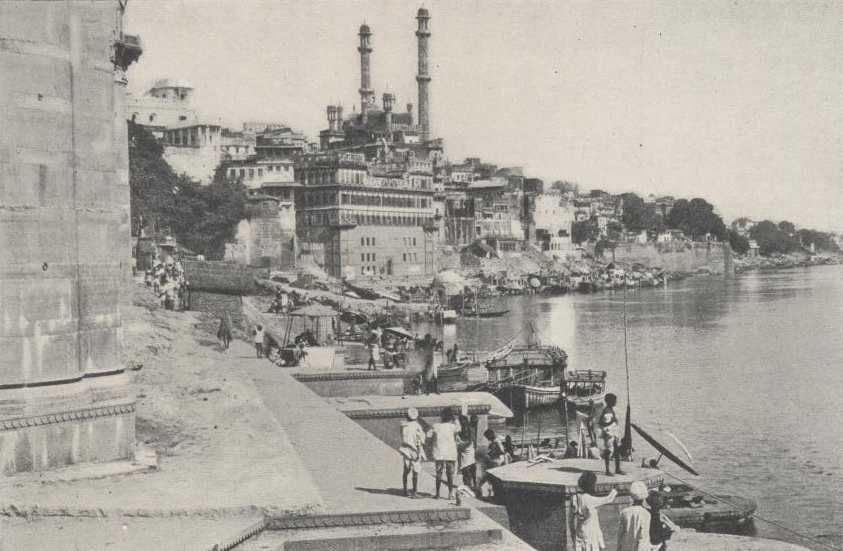You have a long drive through the outskirts of Benares before you get to the hotel. And all the aspects are melancholy. It is a vision of dusty sterility, decaying temples, crumbling tombs, broken mud walls, shabby huts. The whole region seems to ache with age and penury. It must take ten thousand years of want to produce such an aspect. We were still outside of the great native city when we reached the hotel. It was a quiet and homelike house, inviting, and manifestly comfortable. But we liked its annex better, and went thither. It was a mile away, perhaps, and stood in the midst of a large compound, and was built bungalow fashion, everything on the ground floor, and a veranda all around. They have doors in India, but I don't know why. They don't fasten, and they stand open, as a rule, with a curtain hanging in the doorspace to keep out the glare of the sun. Still, there is plenty of privacy, for no white person will come in without notice, of course. The native men servants will, but they don't seem to count. They glide in, barefoot and noiseless, and are in the midst before one knows it. At first this is a shock, and sometimes it is an embarrassment; but one has to get used to it, and does.
There was one tree in the compound, and a monkey lived in it. At first I was strongly interested in the tree, for I was told that it was the renowned peepul—the tree in whose shadow you cannot tell a lie. This one failed to stand the test, and I went away from it disappointed. There was a softly creaking well close by, and a couple of oxen drew water from it by the hour, superintended by two natives dressed in the usual "turban and pocket-handkerchief." The tree and the well were the only scenery, and so the compound was a soothing and lonesome and satisfying place; and very restful after so many activities. There was nobody in our bungalow but ourselves; the other guests were in the next one, where the table d'hote was furnished. A body could not be more pleasantly situated. Each room had the customary bath attached—a room ten or twelve feet square, with a roomy stone-paved pit in it and abundance of water. One could not easily improve upon this arrangement, except by furnishing it with cold water and excluding the hot, in deference to the fervency of the climate; but that is forbidden. It would damage the bather's health. The stranger is warned against taking cold baths in India, but even the most intelligent strangers are fools, and they do not obey, and so they presently get laid up. I was the most intelligent fool that passed through, that year. But I am still more intelligent now. Now that it is too late.
(FE)

Benares was not a disappointment. It justified its reputation as a curiosity. It is on high ground, and overhangs a grand curve of the Ganges. It is a vast mass of building, compactly crusting a hill, and is cloven in all directions by an intricate confusion of cracks which stand for streets. Tall, slim minarets and beflagged temple-spires rise out of it and give it picturesqueness, viewed from the river. The city is as busy as an ant-hill, and the hurly-burly of human life swarming along the web of narrow streets reminds one of the ants. The sacred cow swarms along, too, and goes whither she pleases, and takes toll of the grain-shops, and is very much in the way, and is a good deal of a nuisance, since she must not be molested.
Benares is older than history, older than tradition, older even than legend, and looks twice as old as all of them put together. From a Hindoo statement quoted in Rev. Mr. Parker's compact and lucid Guide to Benares, I find that the site of the town was the beginning-place of the Creation. It was merely an upright "lingam," at first, no larger than a stove-pipe, and stood in the midst of a shoreless ocean. This was the work of the God Vishnu. Later he spread the lingam out till its surface was ten miles across. Still it was not large enough for the business; therefore he presently built the globe around it. Benares is thus the center of the earth. This is considered an advantage.
It has had a tumultuous history, both materially and spiritually. It started Brahminically, many ages ago; then by and by Buddha came in recent times 2,500 years ago, and after that it was Buddhist during many centuries—twelve, perhaps—but the Brahmins got the upper hand again, then, and have held it ever since. It is unspeakably sacred in Hindoo eyes, and is as unsanitary as it is sacred, and smells like the rind of the dorian. It is the headquarters of the Brahmin faith, and one-eighth of the population are priests of that church.
(FE)
Yes, the city of Benares is in effect just a big church, a religious hive, whose every cell is a temple, a shrine or a mosque, and whose every conceivable earthly and heavenly good is procurable under one roof, so to speak—a sort of Army and Navy Stores, theologically stocked.
(FE)
Benares is a religious Vesuvius. In its bowels the theological forces have been heaving and tossing, rumbling, thundering and quaking, boiling, and weltering and flaming and smoking for ages. But a little group of missionaries have taken post at its base, and they have hopes. There are the Baptist Missionary Society, the Church Missionary Society, the London Missionary Society, the Wesleyan Missionary Society, and the Zenana Bible and Medical Mission. They have schools, and the principal work seems to be among the children. And no doubt that part of the work prospers best, for grown people everywhere are always likely to cling to the religion they were brought up in.
(FE)